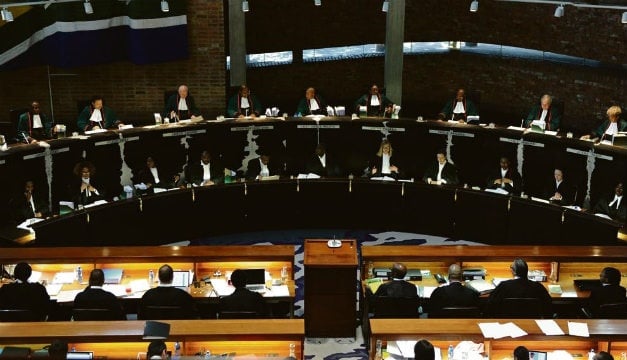


Judges presiding in the Constitutional Court. (File: City Press)
- The Concourt has ruled against the proportional representation system through political parties.
- On Thursday, the court found that part of the Electoral Act was unconstitutional.
- Parliament must amend the Electoral Act within 24 months.
The Constitutional Court has dispelled the notion that proportional representation is consonant only with representation through political parties.
In a landmark judgment on Thursday, the Constitutional Court declared part of the Electoral Act unconstitutional.
Handing down the judgment, Justice Mbuyiseli Madlanga said proportionality does not equal exclusive party proportional representation.
This judgment paves the way for independent candidates to stand for elections in national and provincial elections.
“The idea of proportional representation is not in consonant with independent candidate representation. These sections make no reference to party proportional representation, let alone exclusive party proportional representation,” he ruled.
“The focus of the sections is on the result, whoever the participants may be, the system must be one that results, in general, in proportional representation.”
The judgment came after the New Nation Movement’s (NNM) bid to allow an independent candidate to run for elections challenged the current Electoral Act 73 of 1998, arguing that it infringes on the right to exercise individual political choices.
The NNM wanted the Electoral Act to be amended to allow independent candidates to run in provincial and national elections.
The act only allows independent candidates to run for office at local level. Madlanga has ordered Parliament amend the Electoral Act within 24 months.
In advancing the ruling, Justice Madlanga said it was plain from the provisions of Section 157(3) of the Constitution that proportional representation is quite possible where there is a combination of representation through party lists and representation by individuals who need not be attached to political parties.
He said the Constitution deliberately did not make proportional representation, including party proportional representation, a founding value. “If it had made party proportional representation a founding value, we would not be having this interpretative debate.”
He added:
Although the absence of evidence on justification does not exempt this Court from the obligation to conduct the justification analysis, I can conceive of no reason to hold that the limitation is justified. Thus insofar as the Electoral Act makes it impossible for candidates to stand for political office without being members of political parties, it is unconstitutional.
Request for delay of 36 months
For a new electoral system to be in place before the next national elections, he ruled that the National Assembly must amend the act within 24 months. In her affidavit to the court, the National Assembly speaker asked for a delay of 36 months to amend the act.
“In accordance with the principle of objective invalidity, a declaration of invalidity that is not coupled with a limit to its retrospective effect would invalidate all elections that followed the first election under the Constitution. We cannot allow that to happen as we cannot undo what has taken place pursuant to those elections. The declaration of invalidity must be with effect from the date of this judgment,” he said.
Reacting to the judgment, the Electoral Commission of SA said the timing of this judgment, and the parliamentary review of the electoral system it prompts, is opportune given both the maturing of South Africa’s democracy and the looming impact of the Covid-19 pandemic on election processes around the world.
“The Electoral Commission welcomes the clarity the Court has provided to the interpretation of the rights of citizens to stand for public office. We will study the judgment in detail to reflect on its full implications for the current electoral system and legislative framework governing national and provincial elections,” commission chairperson Glen Mashinini said in a statement.

